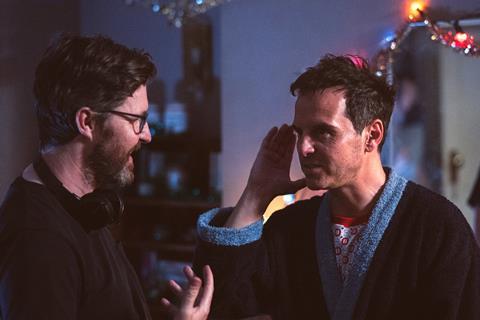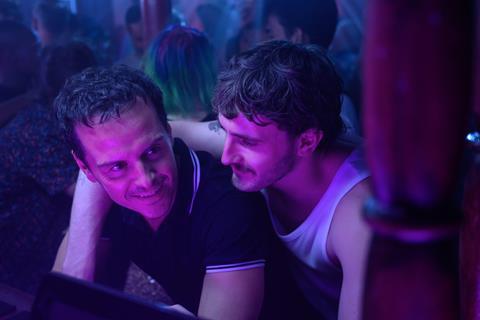Andrew Scott on playing a grieving screenwriter in Andrew Haigh’s love story All Of Us Strangers

Andrew Scott remembers the exact feeling he had when he first read Andrew Haigh’s screenplay for All Of Us Strangers. “I was actually really upset reading this script. It wasn’t because it made me sad, it was that it made me feel raw. I saw a huge amount of tenderness in the script and I related to it so much.”
All Of Us Strangers — which premiered at Telluride in late August, and releases via Disney’s Searchlight Pictures in the US on December 22 and in the UK in January — stars Scott as Adam, a 40-something screenwriter living an isolated life in a London tower block. He meets a mysterious neighbour, Harry (Paul Mescal), at the same time that he visits his childhood home in the suburbs and, suspending reality, remeets his mother and father (Claire Foy and Jamie Bell) who died in a car accident when Adam was 11.
Haigh took the conceit of going back to meet one’s parents as an adult from the 1987 Japanese novel Strangers by Taichi Yamada, but toned down some of the book’s more traditional ghost story elements, relocated the setting to the UK and made the lead character gay, all of which made it much more personal to the filmmaker. The director of Weekend, Lean On Pete and 45 Years even returned to his childhood home near Croydon, south London to shoot the family scenes (he had not lived in the house for 40 years).
Scott says he did not talk to his own parents about the role but “certainly I drew on my own experience”. He also felt a close connection to Haigh’s background.
“I have never met Andrew’s parents and Andrew has never met mine, but because we were shooting in Andrew’s family home, sometimes I had this feeling, ‘Oh my god, he would have lost a tooth in that little bathroom, and now a crew is stampeding through here.’ It was an extraordinary thing for him to take us back to that childhood house.”
Born in Dublin and now living in London, Scott is best known for past roles including MI5 boss ‘C’ in Spectre, as a gay Welsh activist in Pride, antagonist Moriarty in Sherlock and the hot priest in Fleabag.
His Irish childhood did not exactly match Haigh’s near Croydon but they shared a lot in common. “My challenge was to make a marriage between his story and mine,” Scott explains. “We spoke an awful lot about our own experiences, and our own times of growing up in the early ’90s, so I could feel so much in relation to my own pain or joy. Sometimes I think what is really required of you [as an actor] is to show as much of yourself as possible, and that’s what I tried to do… and it was a real catharsis for me.”
A love story

While All Of Us Strangers does explore loneliness and grief, at its heart, Scott says, “It is a story about loving and being loved… Of course, this is a queer story at the centre of it, but everybody has a parent, whether they have a relationship with them or not, or you may have children or you may have a lover or you may understand the real feeling of being lonely.”
Scott’s journey as Adam is multi-layered, starting with the physical — for instance, being a grown man in children’s pyjamas crawling into bed with his parents.
“The way a child might be physically with their parents is being smaller than them in almost every way.” Scott also mapped out Adam’s emotional journey — he is changed through a series of encounters with his parents — allowing him to open up in his burgeoning relationship with Harry.
The family scenes shot for two weeks with Bell and Foy. “We did that more or less chronologically [so it was] an intense time in that house,” Scott recalls.
Scott, Mescal, Foy and Bell were all nominated in the performance categories of the British Independent Film Awards (among 14 nods in total).
Scott enjoyed a strong working relationship with Mescal, and the pair have maintained their friendship since the shoot. “Paul is a really hard worker — he wants it to be right and he wants the tone of it to be right,” Scott says. “I love that the relationship is so tender between the two of them. Sometimes sex scenes between two male actors can veer towards the sexual and I think it is more radical to show the tenderness between these two people — not that these things have to be mutually exclusive.”
The pair worked with an intimacy co-ordinator for the sex scenes. “Sometimes those scenes that are postcoital have a gentleness that can feel more exposing than the ones that were purely physical,” he adds.
Scott, who has been openly gay for more than a decade, carefully considers the calls from some parts of the industry for more gay actors to be cast in gay roles. “I remember growing up and reading Empire magazine and thinking I would never get a chance to play leading roles in the cinema. And I am thrilled that has changed,” he says.
“As much as I feel like representation is important, so is transformation… I don’t love the idea of being cast for something purely for my own sexuality — you’re not just playing ‘gay’, you’re playing the attributes of the character. I don’t want a totalitarian regime — we have to look at each individual story we’re telling and what’s right for that.”
He has certainly had a few years of intense experiences — he read Haigh’s script in 2021 when he was in the midst of a long pandemic-delayed Italian shoot playing Tom Ripley in Netflix’s new Patricia Highsmith series Ripley, created by Steven Zaillian. Then he shot All Of Us Strangers and soon followed it with his acclaimed one‑man Vanya in London’s West End.
The actor finds commonalities in Ripley, All Of Us Strangers and Vanya: “They definitely all explore themes of loneliness or solitude. That’s not something I chose by design, but this feels like a phase in my work… I don’t mind that, if you’re always looking towards the light. I think if our job is to reflect what it’s like to be a human being, and if you are a human being in a state of despair or loneliness or grief, you look for the light, you make a joke.”
Scott is moved to tears when talking about Strangers as being a personal and unique project (Screen International is the first publication to speak to him about the role after the SAG-AFTRA strike lifted). He tries to put it in words: “One thing that I felt was that I didn’t want to ‘act’, I don’t want to be false. It is so wonderful to have this opportunity to tell the truth — I know some of the things that [Adam] is going through — with people who you trust. With Andrew and the actors, to create something that makes people feel seen or feel better, it feels magical.”

























No comments yet